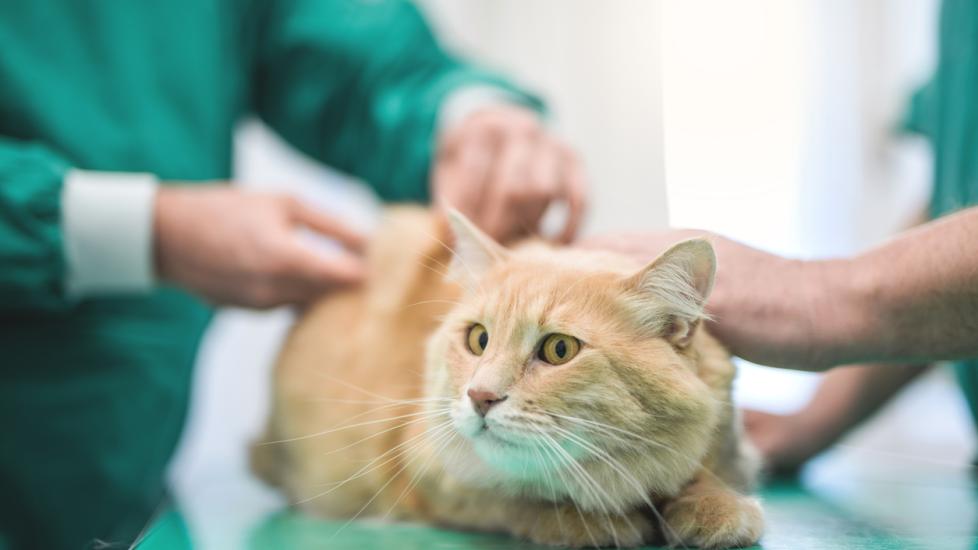Kidney Infections in Cats
What Are Kidney Infections in Cats?
The kidneys are two organs in a cat’s abdomen. They filter toxins from the body and excrete these toxins via urination. They also work to direct electrolyte and protein shifts in the body, which are important for normal body functions.
Kidney infection (also termed pyelonephritis) affects the renal pelvis, a funnel-like portion inside the kidney that filters urine from the kidney to the ureter (the tube that carries urine from the kidney to the bladder). Infections that develop in the kidneys are termed upper urinary tract infections. Infections that occur in the bladder and urethra are called lower urinary tract infections.
Kidney infections are uncommon in cats, but lower urinary tract infections are very common. Some cats are more prone to kidney infections than others, including cats with diabetes mellitus; cats with chronic kidney disease; cats prone to lower urinary tract infections; cats with urinary tract stones; and those born with immune issues (feline leukemia or feline immunodeficiency virus) or congenital issues with their kidneys, such as amyloidosis or polycystic kidney disease.
If left untreated, pyelonephritis can lead to kidney dysfunction, kidney failure, or sepsis, a bacterial infection that spreads to the bloodstream. Early diagnosis and appropriate therapy are critical.
Symptoms of Kidney Infections in Cats
Symptoms of pyelonephritis can range from mild to severe. Often, no clinical signs are noted early in the condition. As it progresses, symptoms might include:
-
Increased thirst or urination
-
Straining to urinate
-
Frequent urination with small amounts of urine produced
-
Blood noted at the end of urination
-
Fever
-
Pain when touching kidneys or abdomen
-
Vocalizing during urination
-
Urine with an unpleasant odor
-
Back pain
-
Decreased appetite
-
Vomiting
-
Lethargy
Causes of Kidney Infections in Cats
Pyelonephritis in cats is most commonly caused by E. coli or Staphylococcus bacterial infections. These infections usually start in the urethra or bladder, then move to the ureters.
Some risk factors can make cats more prone to kidney infections. These include malformations such as ectopic ureters and renal dysplasia; and medical conditions such as diabetes mellitus, kidney failure, stones in the urinary tract, chronic steroid administration, urine retention for long periods, and urinary catheterization—which can introduce bacteria from the outside environment.
How Veterinarians Diagnose Kidney Infections in Cats
Your veterinarian will likely already have or take a history of your cat and do a thorough physical examination as the first steps in diagnosing a possible kidney infection. They will likely recommend full bloodwork to assess kidney enzymes, protein levels, electrolytes, and red and white blood cell counts. Bloodwork helps investigate for systemic diseases that can predispose cats to pyelonephritis, as listed above.
Your veterinarian will also recommend a urinalysis to look for signs of infection in the urine, such as blood, protein, white blood cells, or bacteria. A urine culture is often also considered. This can allow the isolation of specific bacteria, which then helps determine the best antibiotics to fight off the infection.
Abdominal radiographs and abdominal ultrasound are often used to help differentiate between lower and upper urinary tract infections. These will also allow investigation for urinary tract stones or congenital abnormalities that predispose cats to pyelonephritis.
Treatment for Kidney Infections in Cats
Pyelonephritis treatment depends on the underlying cause. Cats are often treated as outpatients unless they are not eating well, are dehydrated, are clearly in pain, or have signs of sepsis or kidney failure. These more severe cases often require hospitalization with intravenous fluid therapy and intravenous antibiotics. Less severe cases (in cats that are well hydrated and are eating well) can be treated with oral antibiotics and sometimes pain medications.
If other systemic diseases are causing the pyelonephritis, they will require appropriate therapy for resolution of the infection. Surgery is sometimes necessary if urinary tract stones are found—especially if they are noted within the bladder. These can be a source of infection and put cats at a high risk of urinary blockage (a medical emergency)
Recovery and Management of Kidney Infections in Cats
Antibiotics are chosen based on urine culture results, which again help isolate the exact bacteria causing the infection. Antibiotic therapy for two to six weeks is usually necessary in cases of kidney infection. Often, your veterinarian will recheck a urine sample during or after completing antibiotics to ensure that the infection has been cleared entirely.
Unfortunately, at-home therapy is not effective in treating pyelonephritis in cats, which is why a veterinary visit is so important. Cats with upper or lower urinary-tract disease are at a high risk of chronic, recurrent infections. Cats with chronic urinary tract issues, especially infections, can be more difficult to treat because their bodies can become resistant to continued antibiotic therapy.
Environmental changes shown to lessen the recurrence of lower urinary-tract signs include:
-
Decreasing stress in the household
-
Increasing water intake (switching to canned food or adding water bowls/fountains to the home)
-
Adding more litter boxes to the household
-
Keeping litter boxes clean
Potential complications of pyelonephritis are include sepsis, kidney failure, and in severe cases, death. Contact your veterinarian if your cat is showing abnormal signs or unusual behavior.
Featured Image: iStock.com/DjelicS
